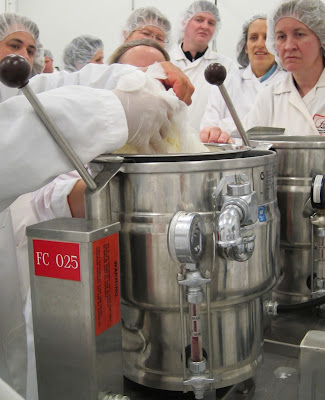In the Midst of the Revolution
We are living in an age of upheaval and change. Long-established institutions, such as the automotive and publishing industries, are crumbling. It’s frightening because the alternatives are not immediately obvious.
Clay Shirky has posted a provocative story about the future of newspapers (the quote below is just part of a much-longer article which is well worth reading). He says:
“Round and round this goes, with the people committed to saving newspapers demanding to know “If the old model is broken, what will work in its place?” To which the answer is: Nothing. Nothing will work. There is no general model for newspapers to replace the one the internet just broke.
With the old economics destroyed, organizational forms perfected for industrial production have to be replaced with structures optimized for digital data. It makes increasingly less sense even to talk about a publishing industry, because the core problem publishing solves — the incredible difficulty, complexity, and expense of making something available to the public — has stopped being a problem.
That is what real revolutions are like. The old stuff gets broken faster than the new stuff is put in its place. The importance of any given experiment isn’t apparent at the moment it appears; big changes stall, small changes spread. Even the revolutionaries can’t predict what will happen. . . .
And so it is today. When someone demands to know how we are going to replace newspapers, they are really demanding to be told that we are not living through a revolution. They are demanding to be told that old systems won’t break before new systems are in place. They are demanding to be told that ancient social bargains aren’t in peril, that core institutions will be spared, that new methods of spreading information will improve previous practice rather than upending it. They are demanding to be lied to.”
Shirky points out that we are focusing on the wrong question: “Society doesn’t need newspapers. What we need is journalism. . . . When we shift our attention from ’save newspapers’ to ’save society’, the imperative changes from ‘preserve the current institutions’ to ‘do whatever works.’ And what works today isn’t the same as what used to work.”
The same applies to the automotive industry. We need to shift our attention from ‘saving General Motors’ to ‘providing training and job opportunities for former auto workers.’ And we need to learn to live effectively in the midst of the unknown.
(via O’Reilly Radar)
Clay Shirky has posted a provocative story about the future of newspapers (the quote below is just part of a much-longer article which is well worth reading). He says:
“Round and round this goes, with the people committed to saving newspapers demanding to know “If the old model is broken, what will work in its place?” To which the answer is: Nothing. Nothing will work. There is no general model for newspapers to replace the one the internet just broke.
With the old economics destroyed, organizational forms perfected for industrial production have to be replaced with structures optimized for digital data. It makes increasingly less sense even to talk about a publishing industry, because the core problem publishing solves — the incredible difficulty, complexity, and expense of making something available to the public — has stopped being a problem.
That is what real revolutions are like. The old stuff gets broken faster than the new stuff is put in its place. The importance of any given experiment isn’t apparent at the moment it appears; big changes stall, small changes spread. Even the revolutionaries can’t predict what will happen. . . .
And so it is today. When someone demands to know how we are going to replace newspapers, they are really demanding to be told that we are not living through a revolution. They are demanding to be told that old systems won’t break before new systems are in place. They are demanding to be told that ancient social bargains aren’t in peril, that core institutions will be spared, that new methods of spreading information will improve previous practice rather than upending it. They are demanding to be lied to.”
Shirky points out that we are focusing on the wrong question: “Society doesn’t need newspapers. What we need is journalism. . . . When we shift our attention from ’save newspapers’ to ’save society’, the imperative changes from ‘preserve the current institutions’ to ‘do whatever works.’ And what works today isn’t the same as what used to work.”
The same applies to the automotive industry. We need to shift our attention from ‘saving General Motors’ to ‘providing training and job opportunities for former auto workers.’ And we need to learn to live effectively in the midst of the unknown.
(via O’Reilly Radar)




Comments